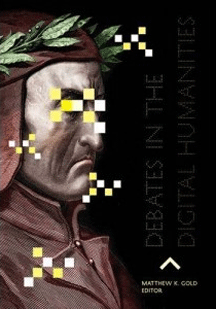By Sean Ross Meehan
One of the primary debates within the emerging academic field of digital humanities concerns defining precisely what the field is and what a digital humanist does. This collection of some fifty articles and blog posts by leading scholars in the field, elegantly printed, provides a rich exploration by way of self-reflection on the field as it has emerged in academic departments in the humanities, particularly in English and History, in recent years.
The question “What is the digital humanities?” is a frequent refrain in these debates. There is a basic, foundational definition at work among these scholars, of course: some deliberate intersection of computing technology with academic subject matter not traditionally associated with computation, “bringing computing technologies to bear on traditional humanities materials,” as Kathleen Fitzpatrick defines it in her essay “The Humanities, Done Digitally.” As more than one scholar notes, digital humanists tend to agree that such digital doings, as a serious field of research and pedagogical inquiry, need to go beyond merely putting up materials on a web page or posting to a blog. That said, Fitzpatrick also notes a central divide in the field, however else one defines the digital humanities, between those scholars who believe “that digital humanities should always be about making (whether making archives, tools, or new digital methods) and those who argue that it must expand to include interpreting.”
The tension evident here is a matter of practice vs. theory. That’s a familiar problem in the academy, and to that extent, this debate within digital humanities may be the best indicator that what started more loosely as humanists interested in working with digital tools has emerged as a legitimate study—legitimate enough, that is, to dispute what it does or should do.
Though written for an academic audience, these essays do not presume academic readers familiar with the topic. Readers only marginally interested themselves in digital tools in their work, or perhaps even not interested at all, will find these debates opening onto larger questions and problems important to the academy and the humanities. Two, in particular, caught my eye. The first is the “ethos of collaboration” that many of the scholars argue is crucial to the digital humanities but lacking in traditional humanities scholarship in its focus on the individual intellect. An interesting implication emerges here: if the humanities, or the liberal arts more broadly, are in crisis in the current academy, digital technology could be more friend than foe to the traditional scholar, given the broader access digital media afford. A second point I found equally to be of interest and concern. To this point in time, the digital humanities has been pursued almost exclusively as a field of research at large universities. At least two of the essays in the collection address this directly, suggesting that the digital humanities needs to involve pedagogy more prominently in its field of practice and inquiry and should include smaller liberal arts institutions as important places where the humanities are done digitally.
If this collection, and the scholars it represents, clearly want to establish a legitimate foothold in academic humanities, they also understand that as a process of doing work in the humanities, the debates can’t be finally settled. To that end, the editor notes in his introduction that in addition to the printed book, there will be an “expanded, open-access webtext” forthcoming offered by the press. Such is another value of the digital humanities embraced by many scholars in the collection, namely, openness.
Sean Ross Meehan (ΦBK, Princeton University, 1991) is Associate Professor of English and Director of Writing at Washington College. He is a resident member of the Theta of Maryland chapter of Phi Beta Kappa.




